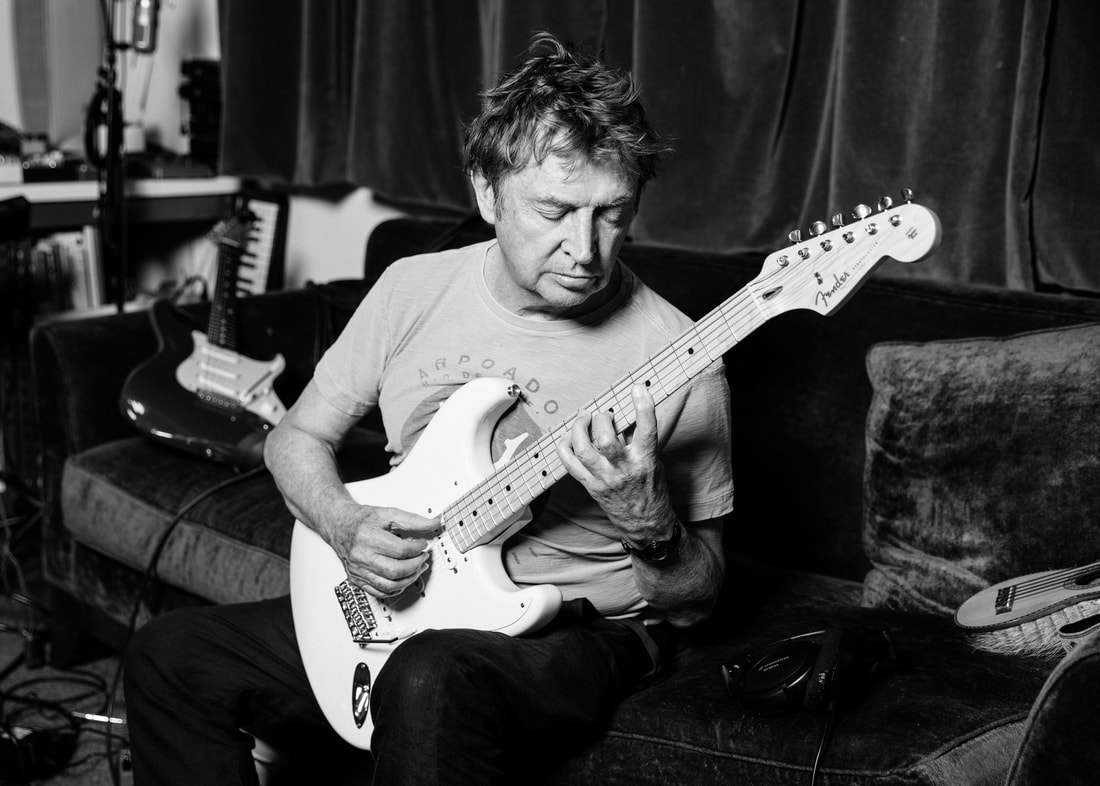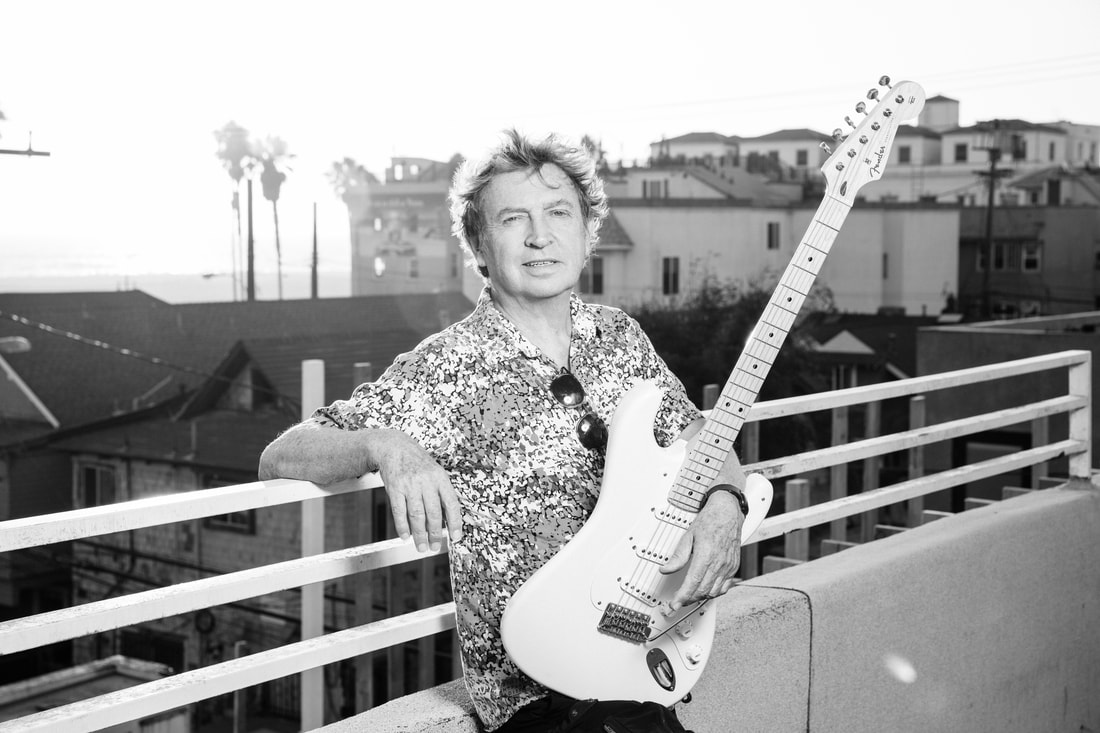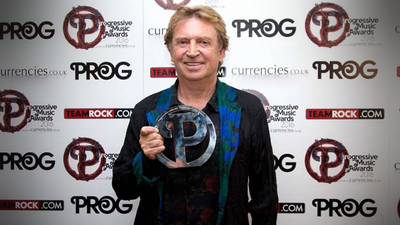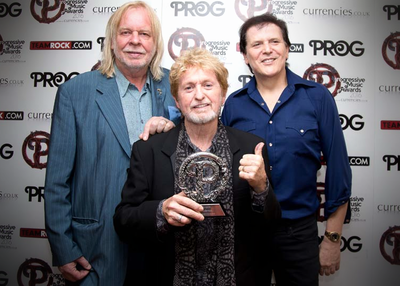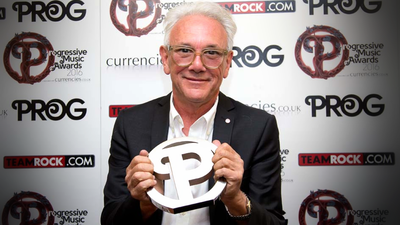|
Andy Summers needs little introduction. As one third of The Police along with Sting and Stewart Copeland, his guitars can be heard on some of the most famous songs of all time. A rock and roll hall of fame inductee, and multiple award -winner, his flair for photography has also brought him great acclaim, with exhibitions taking place all over the world. Now combining his dual interests in a unique performance, Andy is about to launch his ‘Harmonics Of The Night’ one man show in California, before bringing it to Ireland. We sat down with Andy for a chat about the show, his career, and all things Police. Ghost in the machine; Eamon O’Neill.
How are you today Andy?
I think I’m all right today. It’s a beautiful day, I slept all right, came down to the studio, and yeah, it’s looking good. The last time we spoke was at the Progressive Rock Awards in London; how did you enjoy that evening? It was great. It was a lovely Brit evening. I did enjoy it, and met my old friends. It was very nice to get the award, but surprising, because I’ve never really thought of myself as prog rock. But, yeah, it was a really nice evening with a lot of great British musicians. You don’t get many great ‘Brit evenings’ these days, do you? Not like that, no. If I stayed in England I could be getting more of it. Los Angeles is home for you now. I don’t know if it’s home; it’s where I live. My home’s England. You’re bringing your one man show to Ireland for three special concerts; are you excited to be coming over to this part of the world? Yeah! I’m slightly surprised that we have interest. An American guy I met in Los Angeles lives there and is very connected, and he proposed it to me. This show is something I’ve done in Los Angeles, and it caught his imagination and he thought that we could put it on over in Ireland. The gig seemed to be ripe for the presentation. Of course, I’ve had to put a huge amount of work in to develop it – I’m doing it, literally, today. So it’s very the much the beginning of the ‘An Evening With’ format for you? Yeah, it is. I’ve been thinking about it for years that I should be doing this sort of thing. Last year I did it very quickly; I put it together in three days flat, which was a bit breath-taking, and I did it at the Grammy museum in Los Angeles. We sold it out and it went down a complete storm, and it immediately connected with my original thought; “Oh, I should be doing this”. So, that was really the spark that made me want to develop it in more depth. The show is a multi-media performance that combines your twin interests of music and photography; is that what attracted you to doing it? Absolutely. I was always a total, intense film buff. I was very influenced by the movies I saw as a kid, and in a way, it’s almost like being a film maker. I’ve been shooting photography, and had a deep interest in it since the first days of The Police, and I have done up to about fifty exhibitions now. I’ve had quite an involvement. With a camera, it’s just like music; you develop your sensibility, and it gets more and more sophisticated. What format does the show take? I’m going to solo on stage - I’ve got wonderful guitar sounds (as you can get them these days) - to various sequences of photographs that have been shot all over the world. Some of it is quite surreal and strange; some of it is based in places like the far west of China, Tibet, and India. It’s become available, partly because of the digital age; if I was still pouring over contact sheets like the old days, I don’t know if I could have taken this on. I’m putting this together from about 23,000 photographs, so all those pictures have become the raw materials to make a new piece of art, which is the multi-media show. It isn’t your typical gig then. It’s not, no. One of the other things I’m going to be doing is the reading of stories; dark stories. There’ll be music and guitars in there in some way or other as a sort of a hook, with these bleak, modern-day short stories. Oddly, I’m sort of looking forward to doing that part of the show in Ireland, because Ireland and Irish people are very literate – obviously there’s a great tradition there. Is the musical part of the show based on improvisation, or are you going to be playing tracks from your recent albums like ‘Triboluminescence’ [2017]? Well, I think that’s a very good point; it’s both. At the start of the show I come out and I play for five minutes, soloing away, and I’m right in the moment. There’s no formula. I’m not going to do the same thing every night; I’ll just get up and just start playing. Then a loop comes up and I start to play to that, and then I go to some of the tracks from ‘Triboluminescence’, and maybe the album before that. So it’s a mix. Do you plan to play any Police tracks? Well, it would be difficult to do it without the actual band! [* laughing *] I’m thinking about that, because obviously – luckily, or unfortunately – I can’t get away with that. But I’m going to come up with something that will, let’s just say, ‘satisfy that need’. It’s been a decade since The Police reunited; what was it like stepping back into those shoes after twenty years?
Well, I think we played better than we ever played, frankly. There was no problem with the music - why would it be? It’s more difficult to bring together if there’s personal interaction, and you’ve got to really be with one another on this through the whole thing and be supportive; be like ‘we’re in a band’, when of course, everybody’s lives have moved to a very different place. And yet we still have to try and pretend for the duration that we’re a band. But, it did come together. It was a bit rough at the beginning, but it settled down, let’s just say. Once we really got going with the gigs, and we started to really find our groove, it settled into a routine; it’s not really the right word, but a way of continuing on without killing each other. It was great, I thought. It’s interesting that you say that it was rough at the beginning and then settled down; with most reunions it’s the opposite way about. Well, that is traditional, and you’re right; that is the way it usually starts. But we’d been through all of those moves already, a long time ago; it’s just kind of a reverse process! I mean, the first thought really, when you get back together is; “Oh god, not this again; we’re back in the bloody classroom!” And then, the professional side kicks in; “Look, there’s going to be 25,000 people there Thursday night; you better get your shit together. Let’s do it!” And you know, you have to really be the musician, and be in the band, and everybody’s tentatively making remarks about how it should go, and so on and so forth. I mean; these are all songs we know and we’ve all played for years, so it won’t be difficult to put it together in that sense. But to turn it into a whole show, and might I say, a show with amazing precision and moves at split second timing; it was almost like a Vegas show, with the lights, and having to hit a spot at a certain point. It wasn’t just us sloppily arriving at some club; this was a very precise, big-time show. But it was fantastic fun, I’ve got to say. The tour for a time became the third highest-grossing of all time. Well, it would have been the biggest if we’d kept going. The only reason we were beaten by the Stones is because they did it for four years. We over-sold the Stones by about five times, everywhere we played. The enduring popularity of the band must astound you, or do you think to yourself; “Well, we were that good”. Well, of course I like to think that, that we really were that good, and very unique as a band, with so many hits. But, I have to say also, once we said; “Ok, we’re going to do this”, but the tickets hadn’t gone on sale, there was sort of a creeping apprehension about; “Wait a minute; maybe this is a complete fantasy! No-one’s going to come! They just think we’re some old band.” So they had all these dates pencilled in, and the first dates sold out within about two hours. And that was it, and we went; [*sigh of relief*] “Great!”. It went incredibly well. Was the reunion in the planning for a long time? It was pretty quick. It was during 2006 that we started to connect. We all met up at the Sundance Film Festival, and we all sat together, and I think that sowed the seed. I met up with Sting a couple of times in Los Angeles, and then we met again in New York, and collectively, we fired the guy who had been our manager. We were sort of starting to come together, and then came the call; “Okay, we’re going to do it”. It came together really fast, it was almost instant; “Okay, you’re going to do the Grammys”, and we went to Vancouver and started rehearsing. What do you remember about that first rehearsal?
What we did at the beginning was, we just played all the stuff, sort of getting the group ‘chops’, if you like. But we had to play ‘Roxanne’ at the Grammys, and we got that together, but we could literally have done that without the rehearsal. What was the first gig like? It was done for fan club members only. We had 19,000 people at the first show. It was like a trial run, and yeah, it went extremely well. And then we were off and running. The tour came to an end in 2008; would you have liked to have kept going? Yeah. We kept extending it and extending it, and we didn’t know how long to go on for; it’s like we could have gone on forever, or we could have just stopped. We could have gone on for another year, I think. We had done the whole world a couple of times around, and 150 shows, and we sort of fulfilled the obligation pretty well. What for you, is the high point of your career with The Police? In all honesty, I think the reunion tour topped all of it. We’ve had so many phenomenal gigs; even the gig we did in Ireland at Croke Park; 82,000 people turned up, and that was kind of a stunning night. We had just played two nights at the Stade de France in Paris, which was phenomenal. Some of the nights of that tour were really quite incredible. What about from your discography? Well, I think it’s all very good. What can I say? I just wish there had been more of it. I don’t want to say one thing really stands out for me more than the other, because I think they’re all really good. There was a standard that we would always try to reach. But I have a particular affection for the first two records [‘Outlandos d'Amour’ (1978), and ‘Reggatta de Blanc’ (1979)], because I think they’re more fresh, and you can sort of hear the birth of the whole Police thing. Probably the second record is my favourite. It’s a decade on since the end of the tour; do you think a reunion will ever happen again? You never know. It was a long time coming, that one. I mean, I don’t really think about it. Of course, I get asked about it, but I don’t know. To be honest with you, it doesn’t go away, and the songs are great, and I have a band in Brazil that almost started as a joke called Call The Police. For me, it’s great fun; I go down, and the band itself is great. So, I totally enjoy doing it, and I don’t have any shame about it. So you’d be up for it, if you got the call tomorrow morning from Mr. Sumner and Mr. Copeland? Well, they’d have to pay me a lot of money and they’d have to beg, but I would consider it. Back to the upcoming dates, and one of the most interesting aspects is that you’re doing a Q&A section.
The people who come usually know me, and they know my history, and the Q&A is just another form of entertainment. I’ve done it many times; in 2015 I had a film of my book, and I went around the U.S. to showings of the film, and I’d do a Q&A, and it always went really well. I like standing there and people asking me daft questions; you can go off at a tangent and try to be funny. It’s a great way to warm up the audience after all the music and photography. Is the Q&A as entertaining for you, given that you never know what people are going to ask? Yeah, you never know what’s coming, so you have to be on your metal; you have to be really ready to try and be witty. You don’t always have to be funny, you can be sincere, but whatever. Does it surprise you the depth of the knowledge that the hard core fans have? Yeah, they know more about you than you do yourself! [*Laughing] “Christ, how did you know about that!” Yeah, it really happens like that, and people come up with stuff for you to sign, and you’ve never seen it before; “Where did that come from?!” You go; “I wish I had that!” That happens quite a lot. Finally, what next for you? Well, right now, I want to see how this goes, because we might be able to play this out. If it goes really well, I think maybe I’ll carry it on after the summer. Right now, I’m doing this for a couple of months, then I’m playing in Brazil in June, then I’ve got another couple of gigs in the New York area, and then I think to Australia and New Zealand. October, for the last eight years I’ve been going to China every year doing something, so I might go back to China or continue on doing this in Europe. Then next January or February I have a huge photo retrospective in France. I also have a book coming out; an amazing Fender guitar that’s covered in photography – it’s a great project. And I’ve a signature Leica Camera, so yeah, it’s enough! Andy Summer’s Irish tour begins in Cork on 16th May 2018. For tickets click on the links below. NOTE: Since the publication of this article, the Irish dates have been cancelled. Like this interview? Like us on Facebook and follow us on Twitter for regular updates & more of the same. Andy Summers 2018 Dates: 14th Apr- The Regent Theater, Los Angeles 19th Apr - Palace of Fine Arts, San Francisco 16th May - Opera House, Cork, Ireland 17th May - Vicar Street, Dublin, Ireland 18th May - Ulster Hall, Belfast, Ireland |
|
Andy Summers.
"With a camera, it’s just like music; you develop your sensibility, and it gets more and more sophisticated."
© 2016 - 2024 eonmusic.co.ukContact: [email protected]
|

